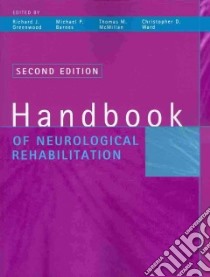Handbook of Neurological Rehabilitation - 9780415648189
Un libro in lingua di Greenwood Richard J. (EDT) Barnes Michael P. (EDT) McMillan Thomas M. (EDT) Ward Christopher D. (EDT) Walton Lord (FRW) edito da Psychology Pr, 2013
- € 56.10
- Il prezzo è variabile in funzione del cambio della valuta d’origine
Changes in the focus of neurological practice worldwide have led to the need for new standard texts that reflect the current state of this expanding area of clinical expertise. The second edition of the Handbook of Neurological Rehabilitation is a major reference source that fulfils this need, providing an invaluable resource for all professions that work with patients suffering from neurological disorders. It brings restorative neurology to the bedside and shows how a reiterative, goal-oriented, problem-solving training programme can benefit patients, sometimes on a scale not achieved by pharmacological or surgical interventions.
The book is divided into three sections all of which have been updated. Section One explores the clinical and biological principles underpinning rehabilitation practice in the context of neurological disablement. Section Two describes the assessment, treatment, and management of the major physical, cognitive and behavioural impairments, and the resulting functional deficits that may follow or accompany neurological disease. The final section explores in more detail these problems and their management in relation to the more common specific disorders of the nervous system.
The text emphasises the fact that rehabilitation is an ongoing process involving multidisciplinary problem-solving, goal-setting and education; in which organised care is more effective than unorganised care; and the breakdown of professional barriers within rehabilitation, to facilitate the use of combined treatment techniques, improves outcome. It describes the contribution made by neural reorganisation and compensatory mechanisms to recovery of function, focuses on the avoidance of secondary deficit, and explores the physical, cognitive, affective and behavioural problems that may occur after neurological damage.
At a time when new medical technologies threaten to fragment the integrity of medical care at individual and societal levels, it is crucial that all those involved in the management of chronic neurological disease have a working knowledge of the contents of this book. Their perspective on clinical practice will then be truly integrated and holistic and their patients will benefit accordingly.
Informazioni bibliografiche
- Titolo del Libro in lingua: Handbook of Neurological Rehabilitation
- Lingua: English
- Autori : Greenwood Richard J. (EDT) Barnes Michael P. (EDT) McMillan Thomas M. (EDT) Ward Christopher D. (EDT) Walton Lord (FRW)
- Editore: Psychology Pr
- Collana: Psychology Pr (Paperback)
- Data di Pubblicazione: 26 Luglio '13
- Genere: PSYCHOLOGY
- Pagine: 740
- EAN-13: 9780415648189


